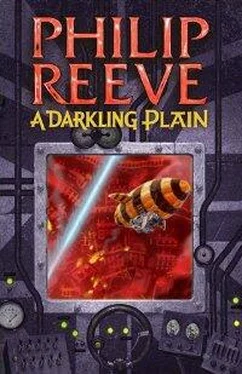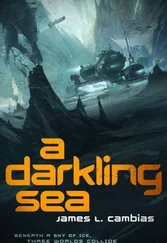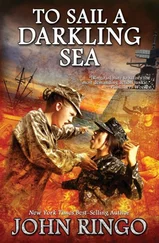I ask only that I be allowed to serve General Naga just as I served his beloved wife.
Chapter 15
The Invisible Suburb
Dawn found the Jenny Haniver above the scarred brown moors of no-man’s-land. The cheerful cluster of cities that surrounded Murnau had sunk below the southwestern horizon sometime in the small hours, and the only city in sight now was a far-off armored hulk called Panzerstadt Winterthur, grumbling north on sentry duty. The Traktionstadts-gesellschaft and the Storm each kept watch on this region out of habit, for they had been outflanked before, but neither seriously imagined the other launching an attack across this marshy, pockmarked landscape, which grew only uglier and less inviting as the light increased. There was nothing down there beneath the mist except the immense track marks of towns.
Some of the older marks were a hundred yards across, steep-walled canyons running straight into the east, their bottoms filled with loose shale and chains of boggy ponds. Looking down at them, Tom thought he recognized the tracks of London, which he and Hester had followed long ago. Soon he would follow them again. This time, Quirke willing, they would lead him home.
“Well, I can’t see a suburb anywhere,” said Wren, wrapping her wet hair in a towel as she came through from the galley, where she had been washing in the sink. The lemony scent of her shampoo filled the flight deck as she went to each window in turn, looking down at the slabs and slopes of mud all shining in the gray dawn. “Nothing!”
“We must be patient,” said Tom, but he could not help feeling uneasy. It did not seem like Wolf Kobold to be late… He circled again. The Jenny felt light and playful, as if pleased to be back in the sky. Her holds were empty, on Wolf’s instructions; presumably he envisaged himself flying home from the wreck of London with a shipload of loot. But where was he?
The radio gave a sudden crackle and began to squeal. It had been tuned in advance to a frequency that Wolf had provided, so it seemed safe to assume that the shrill, ear-splitting noise coming out of the speakers was the call sign of Harrowbarrow’s homing beacon.
Tom scrambled over to turn down the volume, while Wren ran back to the windows. The land below them was as featureless as ever. “I can’t see any suburbs,” said Wren. “It must still be over the horizon.”
“Can’t be,” said Tom, wincing as the signal increased again. “It sounds as if we’re right on top of it.”
It was Wren who spotted the movements in a broad track mark about a mile to the east. The pools of water there were emptying away, and the trees and bushes that had grown around them were starting to move, turning and twisting and falling one against another. The floor of the track mark heaved upward into a high dome of earth, which split and slithered and fell away to reveal a bank of immense, spiraling drill bits and then a scarred, armored carapace. A gray fist of exhaust smoke punched into the sky. “Great Quirke!” murmured Tom.
In the Wunderkammer at Anchorage-in-Vineland there had been the shell of something called a horseshoe crab. Later, when she was trying to explain what Harrowbarrow looked like, Wren would often compare it to that crab. The suburb was small—barely a hundred feet across, and about three times that in length. It was entirely covered by its armored shell. The front end was a broad, blunt shield, into which the drill bits were being retracted now that it was on the surface. (The shield also covered Harrowbarrow’s ugly mouthparts, and could be raised when it wanted to tear chunks off the small towns it hunted, or gobble up a Green Storm fort.! Behind the shield, Harrowbarrow tapered to a narrow stern, protected by overlapping plates of armor. Several of the plates were sliding aside, and Wren glimpsed heavy tracks and wheels beneath them, and a metal landing apron that slid out slowly on hydraulic rams, flickering with landing lights.
“Is that where we’re meant to put down?” asked Wren.
Tom said that he supposed it must be. “Kobold said his place was specialized,” he said wonderingly, “but I had no idea…”
He didn’t like the look of this place, but he told himself that it was just the first step on the way to London, and guided the Jenny carefully down onto the landing platform.
Wolf Kobold was waiting, ready to answer all their questions. It was nearly a week since Wren had seen him, and she had forgotten just how striking he was. The gray dawn and the landing lights and the wind flapping his coattails about made him look more handsome and piratical than ever. But Wren had always had a soft spot for pirates, and at least Wolf’s smile was friendly and welcoming.
Not so his town. All she could see beneath the folded-back armor were blocks of drab gray flats, punched with tiny windows. The people looked gray and drab too as they hurried forward to take the travelers’ bags; stocky scowling scavengers in capes and overalls, with goggles or beetlish dust masks shielding their eyes from the gathering daylight.
“No, Harrowbarrow does not exactly burrow,” Wolf was saying, in answer to something Tom had asked him. “We cannot bore through bedrock or anything like that—it would be far too slow a way to get about! But there are great many nice deep track marks crisscrossing our world, and their bottoms are mostly filled with loose shale and silt and tumbledown; more than enough of it to hide this little place.”
They watched while his men secured the Jenny Haniver to the mooring apron, and then followed him through an alley between the metal buildings and forward along Harrowbarrow’s central street. Stairways rose from it to the second storys of the buildings, poky tenements squashed in under the armored roof. Others led down through the deck plate to engine rooms, whose heat came up through the pavement and the soles of the travelers’ boots. An alcove between the snaking air ducts held an eight-armed image of Thatcher, all-devouring goddess of unfettered Municipal Darwinism.
“Is this your first visit to a harvester?” Wolf asked, watching his guests’ faces as they walked along beside him. “We make no pretense at gentility here, as the larger cities do. It’s a good, sound place, though. It was a scavenger once, till it got captured by a hunting city up in the Frost Barrens. They thought it might be useful for the war effort, so they delivered it to Murnau whole, and my father gave it to me to knock into shape. I’ve recruited people from other harvester suburbs to help me. Rough types, but loyal.”
The whole place smelled like a stove: smoke and hot metal. Wren thought that if she had to live underground, she would take every chance to go outside and breathe fresh air, but the Harrowbarrovians did not seem inclined even to venture out onto the landing apron; they stayed in the shadowed parts of their suburb, and those whose business took them into the daylight hid their eyes behind sunglasses and goggles and wrapped themselves up against the cold in pea jackets and gray felt mufflers.
“Not many women aboard,” said Wolf, with a sideways look at Wren. (She couldn’t tell if he was apologizing to her for the lack of female company or hinting at how pleasant it was to have a visit from a pretty aviatrix. Both, maybe.) “No families live here. It’s a hard life aboard Harrowbarrow. You mustn’t mind my lads if they stare.”
And stare they did, their mouths hanging open in their stubbly faces, as their young mayor led his visitors up a rackety moving staircase into the town hall, a crescent-shaped building that stood on stilts, overlooking the dismantling yards inside the suburb’s jaws. It was ugly, and rather small, but Wolf had furnished it well. There were hangings and tapestries to hide the metal walls, and well-chosen works of art, and when his servants closed the shutters to hide the views of machinery outside, it had a homey feel.
Читать дальше












